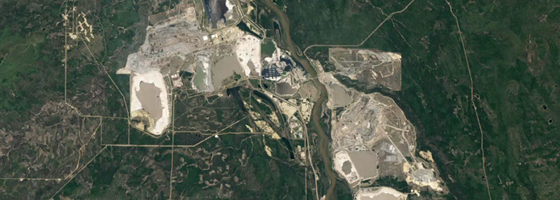Cornell undergrads develop bacteria-based sensor for oil sands monitoring

A team of Cornell University undergraduates have developed a water quality sensor system based on electroactive bacteria that are sensitive to contaminates associated with oil sands extraction, according to the Cornell Daily Sun.
The device, developed as part of the annual International Genetically Engineered Machines competition, houses a species of bacteria that produces an electrical signal when exposed to arsenic or napthalene, two potential drinking water contaminants associated with the process of extracting petroleum from the oil sands of Alberta, Canada. The instrument translates the electrical signal into a measurement of contaminant concentration.
Image: Satellite images show the growth of pit mines over Canada’s oil sands as of 2011 (Credit: NASA/Goddard Space Flight Center)





0 comments